Yadanar Oo, Naw Tah Mu Lar and Maggi Quadrini write about how a football tournament along the Thai-Burma border challenged gender stereotypes faced by young women and girls on the pitch.
In Myanmar, women and young girls are not treated as equals on the football (soccer) pitch. The challenges they face are compounded by a culture that tells them it is not lady-like or acceptable to play sports in general. And so – many do not participate.
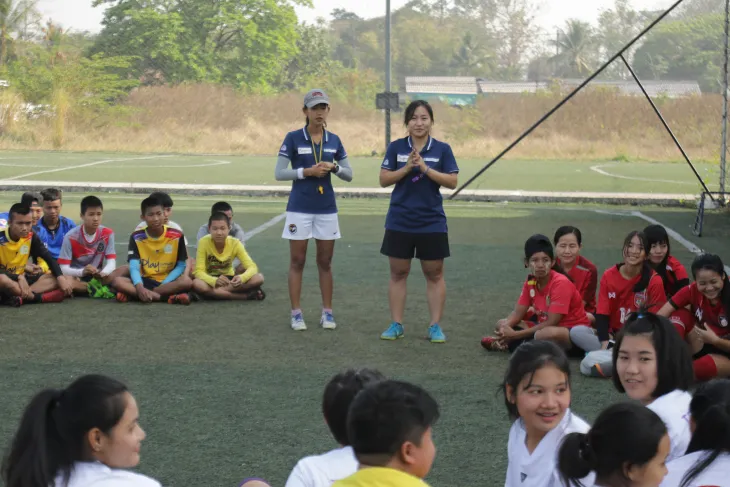
For two young women who grew up in Myanmar, who are now football coaches living along the Thai-Myanmar border town of Mae Sot, International Women’s Day was an opportunity to bring visibility to the challenges young women experience when it comes to their participation in the sport. Yadanar Oo, age 27 and Naw Tah Mu Lar, age 20, work with a local organization called PlayOnside, which brings migrant communities in Mae Sot together through football, and gives children and youth an opportunity to play regardless of their background. PlayOnside hosts football clinics, tournaments, and football festivals, which give communities a platform to meet, learn about, and respect each other. They work exclusively with migrant children from Burma to fill gaps in migrant education through activity-based learning.
Prior to learning about PlayOnside, Yadanar Oo and Naw Tah Mu Lar had never played football before.
“I didn’t want to play because I did not think this was good for women,” said Yadanar Oo. “But my husband encouraged me to try. I realized it was fun and that I wanted to keep playing.” She started to play football two years ago and began coaching in July 2018 without any previous coaching experience. Gradually, she’s gained the technical and leadership skills through the PlayOnside Capacity Building program, which is a comprehensive internal leadership course equipping her with the tools to lead. She is currently the head coach of four teams of boys and girls, as well as a team of children with disabilities.
Her family and friends were concerned when she started playing. Traditionally, women are expected to protect their modesty and playing football opposes those norms.
“In Burmese culture, we wear a longyi and clothes that cover our skin. In football, we show more skin than is accepted when we wear shorts and a t-shirt. This is looked down upon,” Yadanar Oo explained.
Naw Tah Mu Lar graduated from a vocational training program in Mae Sot and was hired as coach at PlayOnside in July 2019. She has also had her friends question her interest and participation in playing football. She recalls the reaction she received from a male friend who once asked her, confused, how women stop a ball with their chests.
“I explained that we catch the ball with all parts of our body and that there is no problem. But I could feel him looking down on me a little bit. In his mind, it was difficult for him to see women and football in the same space,” she said.
As International Women’s Day approached, Yadanar Oo and Naw Tah Mu Lar wanted to send a message by organizing a tournament that made clear the physical and societal barriers women face when it comes to playing football.
The tournament was held on 7 March with four teams of players from PlayOnside and local teams in Mae Sot (totaling over 70 people) who arrived to participate. The games were all played by women – except the last one where young men joined in a co-ed game. In their opening remarks, Yadanar Oo and Naw Tah Mu Lar welcomed everyone and explained the significance of the tournament. They wanted everyone to enjoy themselves, but it was also important to them to have the men experience the physical differences women face. Inclusivity was an important part of the tournament but so was ensuring that the men could relate as closely as possible to what those differences looked like. To make this a reality, before they played in the mixed game, they had to wear water balloons around the chest to simulate breasts. They also had to wear a wet menstrual pad. The response from the men was positive and they showed an exceptional willingness to participate, especially as Yadanar Oo and Naw Tah Mu Lar made clear why and how physical barriers and discomfort are a reality for female players.
“We believe that if men can know and experience our struggles, they will be more understanding of the challenges we face playing football,” said Yadanar Oo.
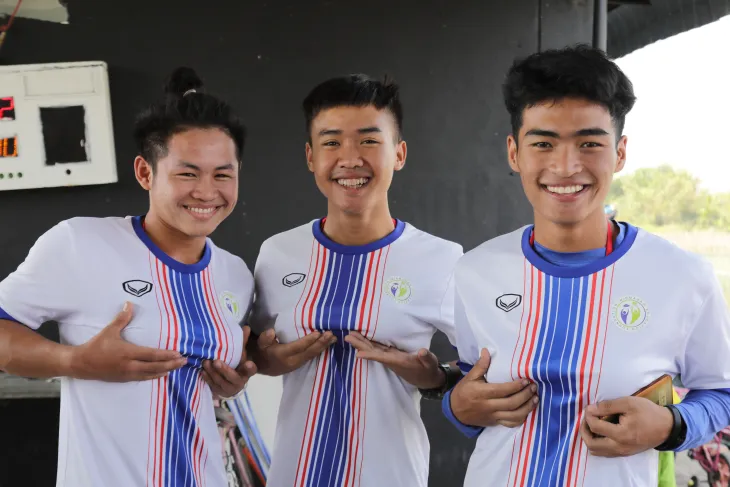
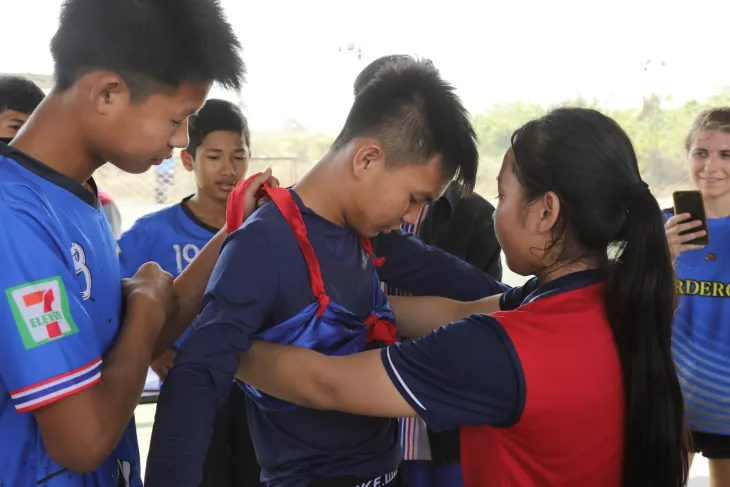
During the women-only games, the men who joined to participate also encouraged the women as spectators. Despite the many challenges that exist for women to justify their interest and participation in football in Myanmar culture, the Women’s Day tournament celebrated their passion and love of the game. It also showed their skills, confidence and respect for everyone participating. Societal barriers impose limits on how women can engage in sports, which usually implies they can observe but not play.
“Women may watch football as a fan, as a hobby. But, we want to encourage them to play football as a career, player or coach,” says Naw Tah Mu Lar.
Geovania Ornai, a teacher in Mae Sot, plays football on several teams, and said she participated in the tournament because she wanted to support the organizers and also to help pass on the message that PlayOnside works to convey – which is that there should be equal opportunity for women and men to play football. She thought the challenges the men had to play the last game with was a strong way for them to understand the physical barriers women overcome.
“It enabled them to understand that these biological differences make it challenging for women to perform as well as men, which creates the social beliefs that question girls and women’s ability to play football. But in fact, as the tournament showed, these barriers did not stop women to perform at a maximal level as men,” she said.
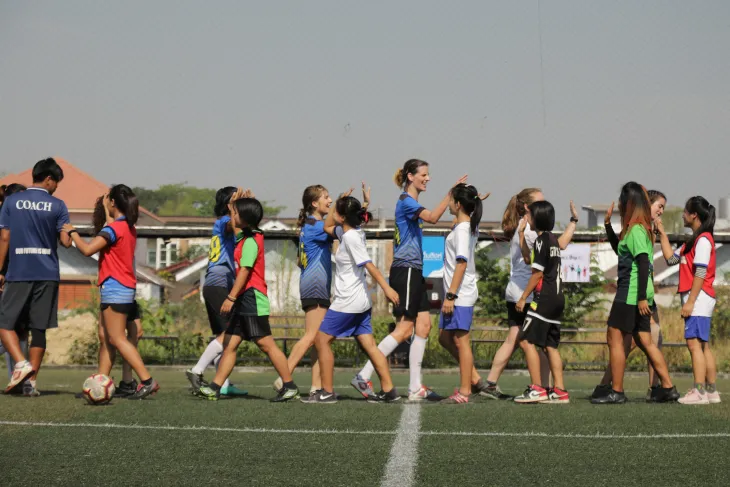
After the games had been played, a discussion took place facilitated by Yadanar Oo and Naw Tah Mu Lar. When the men were asked what it was like to play with the challenges, one replied that his ability felt hindered after just 15 minutes. Another said that he tries passing to women, but gets frustrated when they cannot keep or control the ball. While he encouraged them to be more confident, women are subject to much more pressure that makes assertiveness on the pitch a challenge.
Naw Tah Mu Lar and Yadanar Oo were not entirely surprised by the comment. While they have both had their abilities questioned and undermined simply on the basis of gender, they feel that this shows there is a need to continue having discussions.
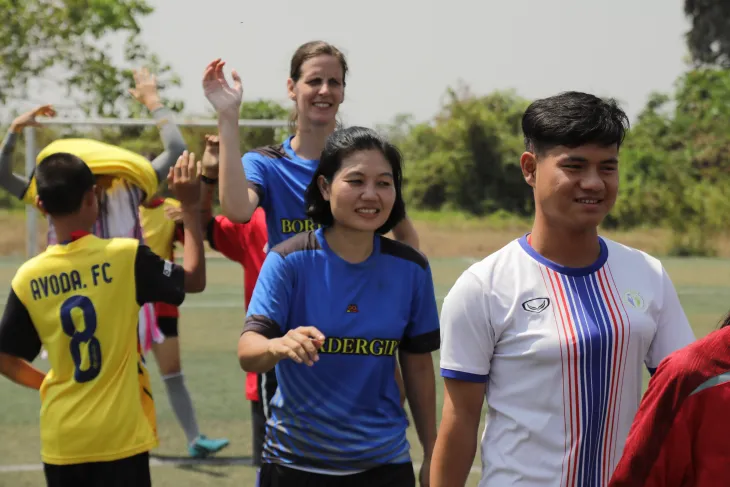
Traditional expectations of young women and girls also limit the spaces they have to try to participate in sports. According to the Gender Equality Network, in most communities included in their study for the 2015 report, ‘Raising the Curtain,’ playing sports was not seen as appropriate for women – while it was seen as good and healthy for boys. The report noted that football was seen as ‘particularly unsuitable for women’ because running and playing was seen as going against cultural norms that suggest women should be modest, quiet and composed.
PlayOnside was co-founded by Javier Almagro in 2013. He says one of the organization’s main goals is to end inequality through football.
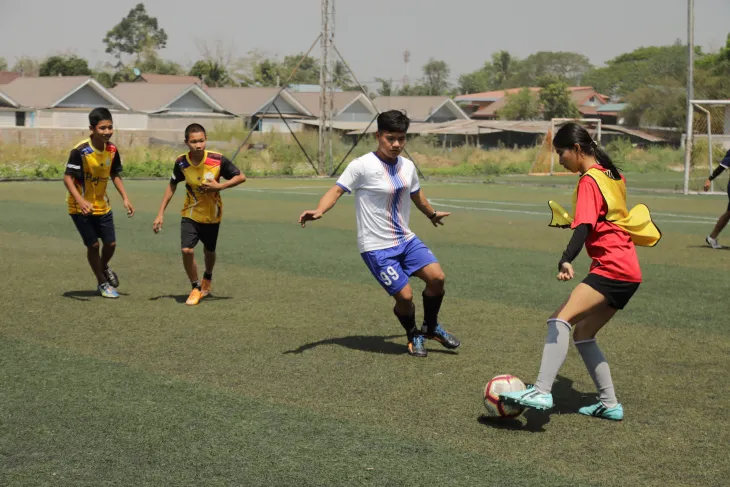
“In a community where women and football were not compatible, PlayOnside is showing that women are capable and can handle the same responsibilities that a man can when it comes to football,” he says.
Almagro says that in his experience, Burmese women see football as a sport for men. Women are presumed to be too weak, and it is seen as inappropriate for a woman to play. Almagro confronts this perception firsthand when visiting migrant schools in the area to introduce them to PlayOnside’s programs. The focus of the tournaments is to promote social inclusion in the migrant community and to provide a platform for the children to have fun and make new friends from other communities.
“The headmasters and headmistresses do not allow the girls to decide if they want to play. Many parents also worry that it is not safe for them. For the girls who are able to come to join the training, they are very embarrassed and shy at the beginning. Over time, they improve and get more confident,” says Almagro.
One of the criticisms of international organizations working in the field of sports and development is that they tend to overlook the cultural context. A ‘one-size fits’ all solution will not work in Myanmar when there are layers of social constructs that must be understood before programs can be implemented. The strength of PlayOnside is that by working at a community level and having programs adapted to the needs of the migrant community, they are able to explore equality in different contexts. It is about more than just making spaces for equality available, but also understanding that unlearning social limitations and constructs is necessary before young girls and women can feel confident enough to start playing.
Access to sports for women in Myanmar remains a complicated issue and one that women are pushing back on. It is not possible to change behavior and social constructs without challenging the systems that encouraged the beliefs to be widespread and adopted as cultural norms. For Yadanar Oo and Naw Tah Mu Lar, this is not impossible. They see the future of football as one where women are heard, seen and respected on the football pitch. By working to dismantle gender stereotypes deeply ingrained in the social fabric of Myanmar, they are committed to ensuring pathways to football are more accessible to young women and girls. With confidence, skill and passion motivating them, Yadanar Oo and Naw Tah Mu Lar are coaching young women in their communities and reminding them they are strong and have every right to be on the pitch – to play, participate and lead.
Yadanar Oo is working at PlayOnside as a football coach. She is passionate about social inclusion and gender equality.
Naw Tah Mu Lar works for PlayOnside as a football coach. She is passionate about gender equality and empowerment.
Maggi Quadrini works in communications-advocacy for community-based organizations on various projects along the Thai-Myanmar border focusing on gender equality.
Like This Article
December 18, 2024
September 26, 2024

Center for Southeast Asian Studies, Asian Institute 1 Devonshire Place Toronto, Ontario, M5S 3K7, Canada
©TeaCircle All Rights Reserved 2023